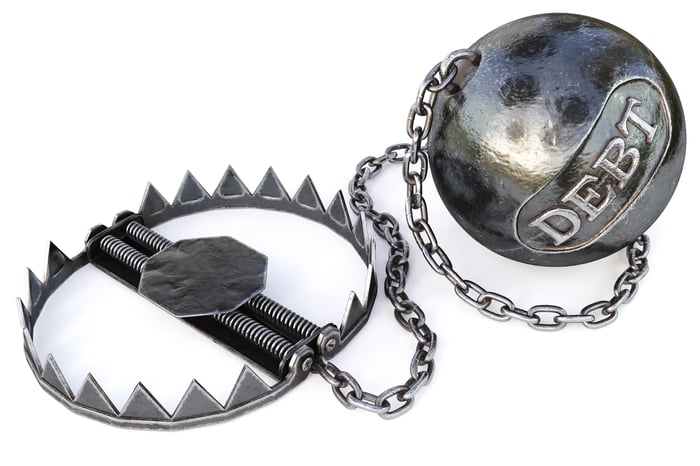Canoo (GOEV 2.59%) recently filed a going concern warning with the Securities and Exchange Commission (SEC), suiggesting the company could curtail operations if it runs out of cash. One important highlight of this warning was that the company needed to access new cash by selling bonds and/or stock. It did just that, raising roughly $45 million via a convertible debt sale. The company's financial problems are not over and could actually be complicated by the sale, though.
Bleeding cash
Canoo is basically in the start-up phase, trying to build an electric vehicle business from the ground up. That costs a lot of money and most of it has to be spent before any material revenue flows in. For example, in the first quarter of 2023 Canoo lost $0.22 per share on zero revenue. That was better than the prior year, when the company lost $0.54 per share while bringing in zero revenue. The important trend here is that Canoo isn't selling anything, it is just spending money.

Image source: Getty Images.
That can only go on for so long before something has to give. With just $6.7 million in cash on the balance sheet at the end of the first quarter and operating expenses of $81.5 million during the quarter, the company looks like it is simply trying to cling to life. That's why management was forced to explain in the quarterly SEC filing that, "If we are unable to obtain sufficient additional funding or do not have access to additional capital, we will be unable to execute our business plans and could be required to terminate or significantly curtail our operations."
That's what's known as a going concern notice. But Canoo was, in fact, able to obtain additional funding, generating roughly $45 million from the sale of convertible bonds. That's not likely to be enough over the long term, but it should help to solve the company's short-term cash needs.
What's the real cost?
The problem here is that this convertible note has some important hidden costs. All bonds come with covenants meant to protect the buyer in the event of the issuer facing financial troubles. The higher-quality the borrower, the less onerous the covenants. Lower-quality borrowers, meanwhile, face more onerous covenants. That makes complete sense from a risk/reward standpoint. Lower-quality borrowers also tend to pay higher interest rates. With no revenue and a going concern notice, Canoo is a low-quality borrower.
On the surface the convertibles carry a 1% interest rate. That's very low, particularly given that interest rates have been moving higher over the past year. However, that's really a function of the convertible feature, which allows the buyer to "convert" the bond into stock. If a company executes well convertible bonds can be highly profitable since they allow the bondholder to participate in the stock's appreciation. But here's the rub: In the event of a default the interest rate on Canoo's convert skyrockets to 15%.
There are 13 things that could lead to a default, including the stock being delisted, untimely filing of financial documents with the SEC, potentially a change of control (basically the sale of the company under certain circumstances), and defaulting on other debt the company may have. These debt covenants are meant to protect the bond buyers. But facing such a large increase in interest costs at a time when the company would likely be dealing with financial problems could easily expedite the path to its cash balance dropping to $0.
In addition to the higher interest rate, under certain circumstances the maturity date could also accelerate. That would materially increase the cash the company would need right away (which, at least at this point, it clearly wouldn't have). That would be an even worse outcome for the company.
Still a troubled company
While it is a positive event for Canoo that it was able to access the cash it clearly needed to keep operating, shareholders shouldn't assume that the long-term financial risk here has abated in any way. If this EV maker's plans to profitably produce a product don't play out as hoped, the new convertible debt probably makes it even more likely that things get worse from here. This is not a stock that most investors should own.





